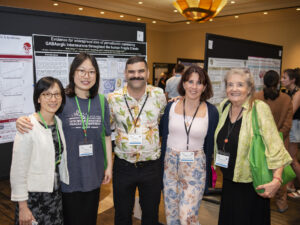About the Study
Who can participate?
Parents and guardians of 6-12 year old females living with the Fragile X premutation, full mutation, and also those living without an FMR1 variation are eligible to participate.
What will happen in the study?
If an individual qualifies and decides to be in this research study, they will complete two online surveys about their daughter(s). Each survey takes approximately 10-20 minutes to complete and may be completed in more than one sitting.
What are the good things that can happen from this research?
There is no direct benefit for participating in the study; however, once the study is completed, some findings may directly benefit females living with an FMR1 Variation and their families in the future.
What are the bad things that can happen from this research?
There is the risk of a breach of confidentiality. To minimize this risk, data will be stored securely on either password protected computers or as hard copy records safeguarded under lock and key.
There may be other risks that we do not know about yet.
Will I or my child be paid to complete this study?
There is no payment for participation.
I’m interested, now what?
Click to begin taking the surveys. For additional information about the study, or to contact the study team directly, you can complete the form below.


